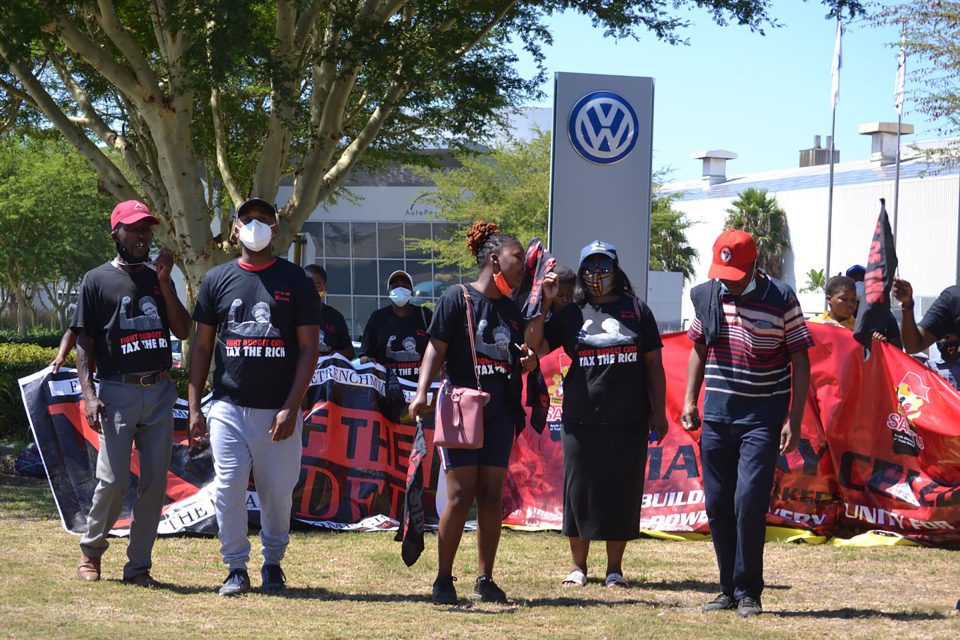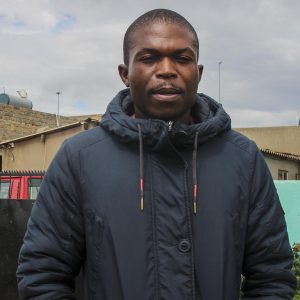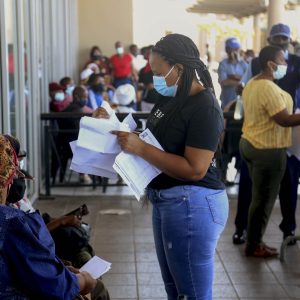VW shop stewards fight coronavirus strike dismissal
Auto-manufacturing workers who were crammed together in Volkswagen’s Uitenhage factory during the Covid-19 pandemic want their shop stewards reinstated.
Author:
8 February 2021

More than a dozen National Union of Metalworkers of South Africa (Numsa) shop stewards who were fired by Volkswagen South Africa (VWSA) in January have filed a dispute at the Commission for Conciliation, Mediation and Arbitration (CCMA). It is scheduled to be heard on 15 February.
The South African Federation of Trade Unions (Saftu) has said it will stage an enormous protest outside the VWSA factory in Uitenhage, Eastern Cape, after the company refused early in February to reinstate the 14 shop stewards.
Saftu held a protest outside the factory on 3 February at the same time as a general meeting was being held inside the factory to discuss the dismissals. Saftu regional secretary Mzikazi Nkata said the federation had hoped the general meeting would result in VWSA management agreeing to reinstate the shop stewards. But the company refused to back down.
Related article:
Saftu spokesperson Luyolo Makwabe said the federation protested in support of the fired shop stewards because their dismissal was set against the backdrop of three million workers losing their jobs during the Covid-19 lockdown, the public-sector wage freeze and billions of rands in public funds being eaten away by corruption during the pandemic.
“Saftu sees all this as a war against the working class and thus we condemn the added insult to this injury by Volkswagen dismissing 14 elected shop stewards,” he said.
Saftu views the mass dismissal “as a tool used by VWSA to instil fear and vulnerability in workers in that company,” Makwabe added.
The shop stewards were fired for “inciting” workers to stop work on 17 July 2020, after an internal VWSA newsletter revealed that 120 workers had tested positive for the coronavirus and a further 60 were in quarantine while awaiting their Covid-19 test results.
The federation said the work stoppage was protected by the Department of Employment and Labour’s gazetted Covid-19 regulations, which state that workers can refuse to work if they can reasonably justify that working would mean “imminent and serious risk of their exposure to Covid-19”.
Crowded factory floor
The shop stewards referred questions to Numsa. Regional secretary Mziyanda Twani said VWSA refused to redesign the factory floor during the pandemic so workers could physically distance themselves from one another, and that there were too many workers crowded into a small space.
“It was just not possible for workers to have social distancing in terms of how the work operations had been designed,” Twani said, adding that the department had told VWSA that it was not complying properly with Covid-19 regulations on physical distancing.

Numsa general secretary Irvin Jim said VWSA had, at that time, “cleared workers to return to work at alarming rates without complying with the necessary protocols”. The company was also “disciplining employees who are close to exceeding their annual sick leave entitlement” and apparently threatening to withhold sick leave from sick employees on the grounds that they must have contracted the coronavirus outside of work, he said.
“The company’s human resources manager, Richard Kasika, was not even prepared to meet with Numsa representatives in circumstances where he felt the number of delegates presented a risk to his health,” added Jim.
According to Numsa, VWSA cut workers’ pay by 50% for some months of the lockdown and they had not yet been reimbursed by the Unemployment Insurance Fund’s Covid-19 temporary relief scheme.
Numsa applied for an interdict against VWSA after it suspended the shop stewards, but withdrew it when VWSA promised to lift the suspensions.
“To our surprise, after we withdrew from the court case, VWSA lifted the suspensions but refused to have discussions with Numsa,” Twani said. The shop stewards were then called to disciplinary hearings and fired in January.
Related article:
German metal workers’ union IG Metall had supported Numsa and asked the VW head office in Germany to ensure that the shop stewards were not dismissed. But Twani said that VWSA defied its head office, which had said it “must go back and have discussions with Numsa in order to find an amicable solution”.
Jim said hundreds of Numsa members at the VWSA plant in Uitenhage now have no union representatives at the factory and that management rebuffed his request to meet.
Historical significance
The concept of a worker-controlled union has historic importance at VWSA. In 2000, the company fired more than 1 300 workers who had gone on strike after refusing to accept Numsa’s decision not to recognise the shop stewards they had elected. This mass axing removed a stable income from the lives of about 10 000 people in the Uitenhage and KwaNobuhle area. Many of those workers have not had a permanent job since, according to a committee of these dismissed workers that still exists 21 years later.
Jim said he “did not want history to repeat itself”. He reminded VWSA chief executive Robert Cisek “of our dreadful past, where the very same management was directly involved in the mass dismissal of workers.
“We told the CEO about the importance of having a management team that is prepared to transform industrial relations at VWSA. We want the company to be successful, but not as a result of oppression and exploitation, but rather through the recognition and realisation of workers’ rights and cooperation,” said Jim.

VWSA spokesperson Andile Dlamini said that the shop stewards had been dismissed for serious misconduct and that all other information related to the dismissals was confidential.
Dlamini said the VWSA workers had not asked the company to reinstate the shop stewards. “The matter has been referred to the CCMA by Numsa and it must be allowed to follow the due legal process,” he said.
He added that Numsa’s allegations of breaches of Covid-19 protocols last year were incorrect.
“The company followed and still follows all the necessary protocols to clear the employees to return to work after they had tested positive for Covid-19 or [been] exposed to a person who had tested positive. There is no truth in any suggestion that any employee of the Company was disciplined for any Covid-19 related absence from work, nor was there any employee disciplined for being close to exceeding his/her sick leave entitlement irrespective of whether such employees contracted Covid-19,” said Dlamini.
Local media reported in May last year that the Covid-19 pandemic would reduce the auto-manufacturing sector by 40%, with some factories shedding jobs and other planned new factories in the Eastern Cape unlikely to open.
Eastern Cape auto-manufacturing workers remain in a precarious position. The factories they work at are often the major employers in their communities. When they close down abruptly – as the Bridgestone tyre-manufacturing plant in Port Elizabeth did last year, and the DCD Wind Towers solar and wind-power manufacturing plant did in 2019 – there are no other jobs available for retrenched workers.


